Residents fear being 'imprisoned' by solar farms
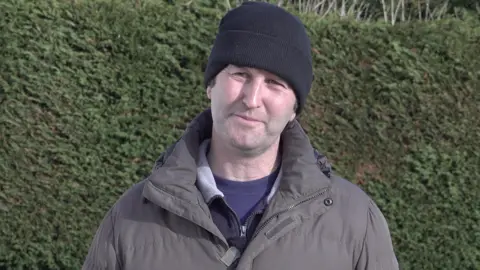 BBC
BBCResidents fighting the construction of large-scale solar farms say they are fearful their homes will be surrounded by industrial equipment.
Mark Peel, who farms near Beverley in East Yorkshire, said he and his family could end up feeling "imprisoned" by the proposed Peartree Hill development on nearby farmland.
"The countryside around here will be gone. It will be like an industrial estate," he said.
The project aims to generate enough energy for 136,000 homes and includes plans for solar panels of up to 11.4ft (3.5m) in height. Developer RWE said it had listened to residents' concerns, reduced solar panel numbers and planned to use bushes and trees to screen them.
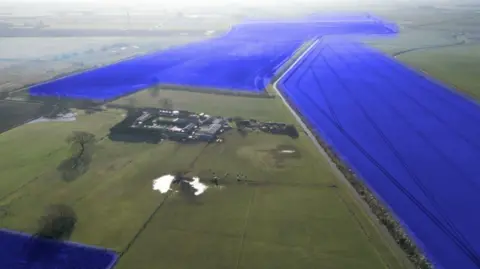
Peartree Hill is made up of several areas of land being connected by a series of underground cables.
The most northern part of the site is located northwest of Leven, with the remainder of the site to be located on land between the villages of Tickton, Riston, Wawne, Weel and Woodmansey.
The planning inspectorate said it expects the application to be submitted this month. The final decision will be made by the energy secretary.
UK planning guidance for solar panels states they should be sited at least 164ft (50m) from the nearest home.
But some residents believe the industrial nature of the projects will impinge on their everyday lives.
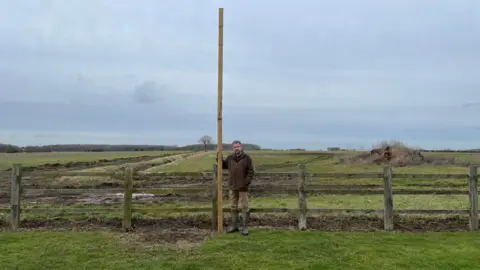
Simon Skelton's home near Gainsborough is in the centre of a solar park that's now been approved and he is concerned about the height of the panels.
He said: "Every window we look out of it'll be solar panels, ranging from a few hundred metres away to just 50m (164ft) away.
"These are 4.5m (14.7ft) high, so the height of a double-decker bus. They're impossible to screen."
The BBC has contacted the developer behind the project.
Campaigners against industrial solar parks have been highlighting what they describe as a "notorious" case in Ireland.
Paul McCue and his family live in the middle of a solar development on the outskirts of Dublin and he said he no longer enjoyed living in his cottage.
"It's just a house now, it's no longer a home," he said.
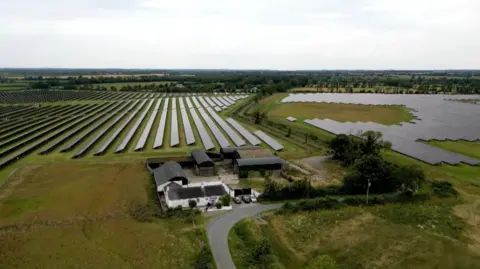 RTE
RTEMr McCue's wife, Denise, said the development had been "life changing".
"Even on our days off we just go out somewhere. We just can't sit around here, it feels like a different place," she said.
Before the solar park was built, the developer offered to buy their home. They sought advice and did not proceed with the sale.
They have been trying to sell up for more than two years, but Mr McCue said they've been told by their estate agent that buyers were "deterred" by the solar farm.
The solar farm was correctly consulted on and received full planning permission from the local council.
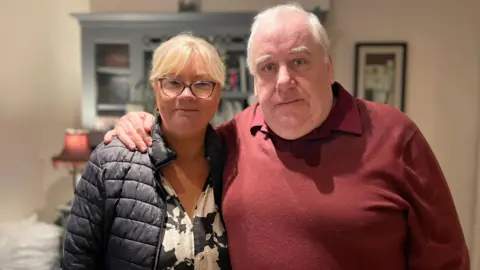
Five large solar farms have already been approved for Lincolnshire with nine more awaiting a decision.
However, not everyone is concerned about living close to industrial equipment.
Natalie Doncaster, who lives near Spalding in Lincolnshire, said the views from her property could soon be dominated by fields of large panels, but said she wanted to "see the bigger picture".
"It is literally across the road and is going to have a big visual impact," she added.
"But the UK needs to be more more self-reliant [for its energy] and not importing oil, importing things from other places."
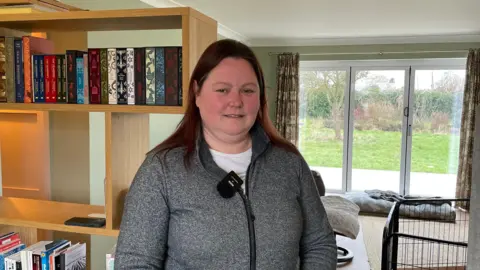
Industry body Solar Energy UK said initial fears are often misplaced.
"One of those is noise. The panels themselves are entirely silent," it said.
"One thing we have found is that solar farms are most popular around where they have been built already, as people soon find that such fears are misplaced.
"They also offer great benefits to biodiversity, while helping to cut our energy bills, too."
Listen to highlights from Hull and East Yorkshire on BBC Sounds, watch the latest episode of Look North or tell us about a story you think we should be covering here.
